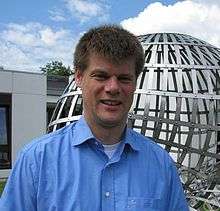Christoph Thiele
Christoph Thiele (born 1968 in Bielefeld) is a German mathematician working in the field of harmonic analysis. After completing his undergraduate studies at TU Darmstadt and Bielefeld University, his Ph.D. was obtained in 1995 at Yale under the supervision of Ronald Coifman. After spending time at UCLA where he was promoted to full professor, he occupies the Hausdorff Chair at the University of Bonn.[1]

He is famous for work (joint with Michael Lacey) on the bilinear Hilbert transform and for giving a simplified proof of Carleson's theorem; the techniques in this proof have deeply influenced the field of time–frequency analysis. He was a recipient of the 1996 Salem Prize,[2] an invited speaker at the 2002 International Congress of Mathematicians[3] and is a Fellow of the American Mathematical Society.[4]
Selected publications
- Lacey, Michael T. (2004), "Carleson's theorem: proof, complements, variations", Publicacions Matemàtiques, 48 (2): 251–307, arXiv:math/0307008, doi:10.5565/publmat_48204_01, MR 2091007
- Lacey, Michael; Thiele, Christoph (2000), "A proof of boundedness of the Carleson operator", Mathematical Research Letters, 7 (4): 361–370, doi:10.4310/mrl.2000.v7.n4.a1, MR 1783613, archived from the original on 2008-07-05
References
- http://www.hcm.uni-bonn.de/de/people/profile/christoph-thiele/
- "Archived copy". Archived from the original on 2017-07-04. Retrieved 2018-02-12.CS1 maint: archived copy as title (link)
- https://www.mathunion.org/icm-plenary-and-invited-speakers
- https://www.ams.org/profession/fellows-list